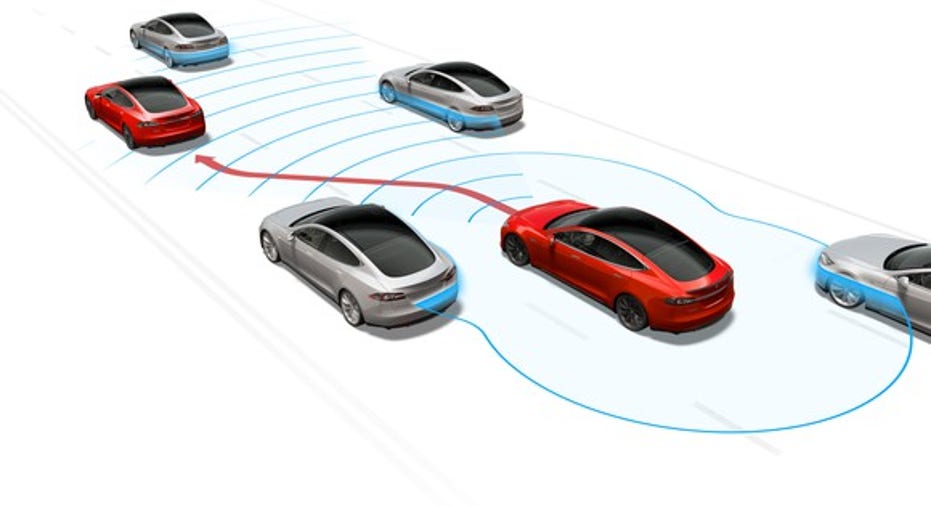3 Strong Stocks to Invest in the Driverless-Car Race

Driverless-car stocks are revving up for a record-breaking year. If you're on the hunt for a pure play on the trend, though, you're out of luck. There are essentially no publicly traded companies dealing exclusively in driverless cars. But at The Motley Fool, we're always on the lookout for creative investment angles. Here are three driverless-car stocks that let you invest in the technology, the car, and the data for the driverless-car revolution.
1. MobilEye -- The technology
MobilEye Co-Founder and CTO Amnon Shashua. Image source: BMW.
Jerusalem-based MobilEye (NYSE: MBLY) is as pure a play as they come for driverless-car stocks. It manufactures the cameras for advanced driver assistance systemsin approximately 220 car models. In July, MobilEye announced a partnership with BMW and Intel to develop an autonomous-vehicle platform by 2021. Just a month later, it went even further when it announced a partnership with auto supplier Delphi Automotive to develop a "plug-and-play" self-driving platform available for any automaker to adopt by 2017.
MobilEye seems to be poised for profit -- it just announced a 34% year-over-year quarterly revenue increase and prides itself on an asset-light business model. For investors, this signals both a buying opportunity and a valuation warning. Its stock jumped 27% after the recent news and has wavered back and forth over the past few years alongside industry-level bullishness and stock-specific announcements. Investors in MobilEye should be bullish on the commoditization of driverless technology and have a long-term perspective to weather the ups and downs that will probably continue.
2. Tesla Motors -- The car
Image source: Tesla Motors.
Tesla Motors (NASDAQ: TSLA) is not a driverless-car stock, but it is vehement in its belief that automation is the automotive future. All its vehicles come equipped with Autopilot, a technology that Tesla founder and CEO Elon Musk says will allow Teslas to drive themselves across the country by (hopefully) 2018. As a first major adopter of semi-autonomous driving, Tesla has experienced setbacks, most notably a driver fatality last May.
A Tesla Motors stock investment allows investors to get behind the wheel of an already-scaling semi-driverless carl, something that no other company can offer. But Tesla is also much more than a driverless-car stock. The company is, first and foremost, a (driver-filled) car company. Its recent $2 billion merger with SolarCity also makes it a solar company, an industry with substantial regulatory unknowns of its own. The company is betting on significant synergies by packaging solar rooftops with car sales, but these major moves have kept many investors on the fence about its future. For Tesla to make the driverless-car stock list, investors need to be sure they're bullish on its entire business.
3. Alphabet -- The data
Video source: Waymo via Youtube.
Alphabet (NASDAQ: GOOG) (NASDAQ: GOOGL), the parent company of Google, has been making major moves in the driverless-car space. The company has spent more than $60 million to bump humans out of the driver's seat, and last October, it announced that it had clocked a whopping 2 million road miles on its autonomous vehicles. Last month, Alphabet went a step further by redefining its automation efforts as a full-fledged spinoff business dubbed Waymo, rather than one of its prototype "moonshot" projects.
Alphabet and Waymo have made clear that they're not interested in car manufacturing, a hat tip to others such as BMW that are already well entrenched in this space. Instead, it will focus on taking what it's learned from its cute "panda car" prototypes and transferring it to commercial cars, such as the 100 Chrysler Pacifica Hybrid minivans that are set to join Waymo's fleet in early 2017. Waymo has a strong technological advantage over many competitors, but where it truly shines is its access to and refinement of data. Self-driving cars risk being aimless wanderers without enough information about their surroundings, and Alphabet has more information about the world than anyone else, and is continuing to learn how best to use it in the quest for an autonomous vehicle.
With an Alphabet investment, investors need to understand that driverless cars are not one slice of this company's pie -- they're a crumb. With Alphabet's $550 billion market cap, Waymo's minuscule $60 million fleet of pandas and minivans is not what this company's counting on to drive profits in the years to come. But Waymo is yet another example of how Alphabet is capitalizing on its core competitive advantage in ways that were not previously expected -- and if that's what you're interested in investing in, then Alphabet may be the driverless-car stock for you.
Pedal to the metal?
With driverless-car technology still in its infancy, it can be tempting to take a backseat to investing in this industry. But for risk-tolerant investors with a long-term perspective, getting in on the ground floor of a driverless-car stock might be the best way to snag major returns in the years to come, whether it's by investing in the technology, the car, or the data.
10 stocks we like better thanWal-MartWhen investing geniuses David and TomGardner have a stock tip, it can pay to listen. After all, the newsletter theyhave run for over a decade, the Motley Fool Stock Advisor, has tripled the market.*
David and Tomjust revealed what they believe are theten best stocksfor investors to buy right now... and Wal-Mart wasn't one of them! That's right -- theythink these 10 stocks are even better buys.
Click hereto learn about these picks!
*StockAdvisor returns as of December 12, 2016The author(s) may have a position in any stocks mentioned.
Suzanne Frey, an executive at Alphabet, is a member of The Motley Fool's board of directors. Justin Loiseau owns shares of Alphabet (A and C shares), and Tesla Motors. The Motley Fool owns shares of and recommends Alphabet (A and C shares), and Tesla Motors. The Motley Fool has a disclosure policy.



















